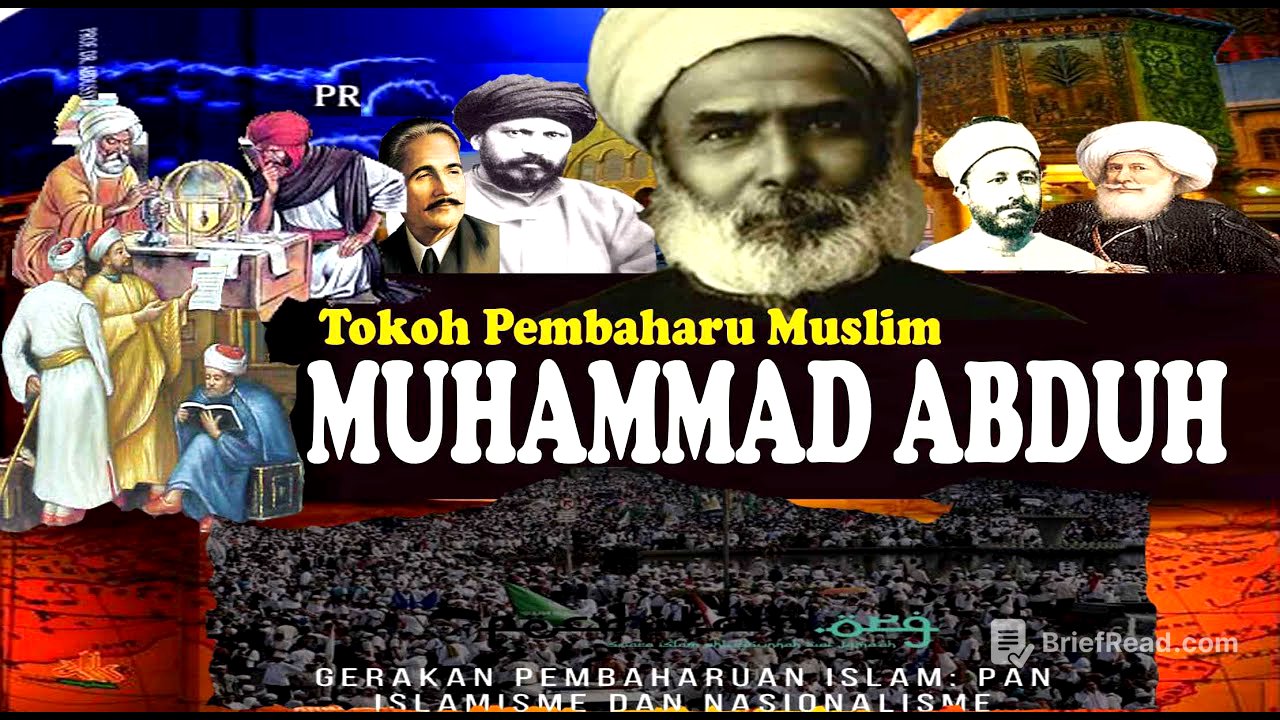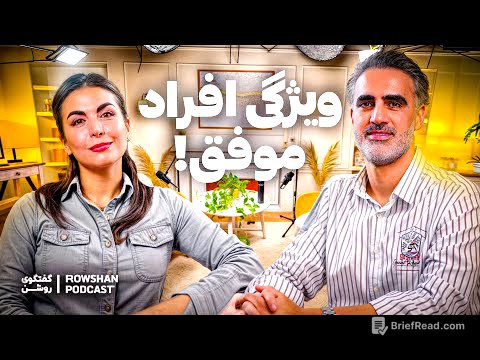TLDR;
This video introduces Muhammad Abduh and Rasyid Ridha, two significant Islamic reformers, exploring their motivations for reforming the Islamic world. It examines their criticisms of Sufism, their alignment with Jamaluddin al-Afghani, and their opposition to practices like superstition and taqlid, advocating a return to the Qur'an and Sunnah. The video also highlights Abduh's life, education, and reform agendas, including purification of Islamic teachings, educational reform, and defending Islam against scientific attacks.
- Introduction to Muhammad Abduh and Rasyid Ridha as Islamic reformers.
- Focus on their reform agendas: purification, education, and defense of Islam.
- Highlights Abduh's life, education, and key influences.
Introduction: Muhammad Abduh and Rasyid Ridha, Islamic Reformers [0:25]
The video introduces Muhammad Abduh and Rasyid Ridha as influential Islamic reformers, highlighting the importance of understanding their motivations and actions. It aims to uncover the reasons behind their movement to purify Islamic teachings and their call to reopen the door of ijtihad, which is independent reasoning or interpretation of Islamic law. The discussion also promises to explore their criticisms of Sufism, their connection to Jamaluddin al-Afghani, and their strong stance against practices like superstition and blind imitation, all while advocating for a return to the core principles of the Qur'an and Sunnah.
The Early Life and Education of Muhammad Abduh [2:12]
Muhammad Abduh was born in 1849 in the Nile Delta, Egypt, the same year that Muhammad Ali Pasha, a significant Egyptian reformer, died. Abduh's early life involved nomadic movement with his family, his father was an immigrant from Turkey, and his mother had Arab lineage. He demonstrated a strong aptitude for learning, memorizing the Quran by age 12. His formal education at the Al-Ahmadi Mosque in Tanta initially proved unsatisfying due to its emphasis on rote memorization without comprehension. Discontented, he returned home, married briefly at 16, and was then influenced by his Sufi uncle, Sheikh Darwish, who instilled in him a love for learning and Sufi spiritual practices.
Abduh's Intellectual Development and Connection to Al-Afghani [6:12]
Despite returning to Al-Ahmadi Mosque and later attending Al-Azhar, Abduh remained dissatisfied with the traditional teaching methods. This led him to Sufism and, in 1871, to Jamaluddin al-Afghani, who provided him with a more fulfilling intellectual environment. Al-Afghani's methods and teachings liberated Abduh from psychological turmoil, leading him to expand his studies into philosophy, social sciences, and politics. Although raised in Sufism, Abduh became critical of its excessive cultism and preferred al-Afghani's egalitarian approach.
Abduh's Academic and Political Activities [8:27]
Under al-Afghani's guidance, Abduh became a pioneer in spreading his mentor's pan-Islamist thoughts at Al-Azhar. After completing his studies in 1877, Abduh lectured at various institutions, teaching theology, history, political science, and Arabic literature. However, his political involvement led to exile in Beirut, Lebanon, where he continued teaching and writing, including his notable work, "Treatise on Tauhid." Despite being exiled, Abduh was later allowed to return to Cairo and lead the newspaper Al-Waqai' al-Misriyya.
Abduh's Involvement in the Urabi Revolution and Subsequent Exile [11:20]
In 1882, Abduh joined the Urabi Revolution, a nationalist movement against state injustice, leading to another exile in Beirut and France. In France, he reunited with al-Afghani and co-founded the journal "Al-Urwatul Wuthqa," which was later banned by European nations. Returning to Beirut, Abduh continued to write and teach, advocating for change and renewal in Islam through education and culture rather than revolution.
Abduh's Return to Egypt and Appointment as Mufti [13:00]
Upon his return to Egypt, Abduh was initially barred from teaching due to government concerns over his influence. He then served as a religious judge and became a member of the Al-Azhar Assembly, contributing to reforms in the educational institution. In 1899, he was appointed Mufti, continuing to promote his reformist ideas, which faced resistance from static-minded scholars and the general public. Abduh died on July 11, 1905, and was buried in Cairo.
Abduh's First Agenda: Purification of Islamic Teachings [14:16]
Abduh's renewal movement had three main agendas, the first of which was the purification of Islamic teachings from incorrect influences, focusing on adherence to the Qur'an and Sunnah. He strongly opposed bid'ah (innovations) and khurofat (superstitions) that had infiltrated Muslim religious life, viewing shirk (idolatry) in any form as unacceptable. Abduh believed that the decline of Islamic countries stemmed from the confusion of religious thinking caused by Western civilization and the stagnation within the Islamic Ummah.
Abduh's Critique of Rigidity and Fanaticism [15:38]
Abduh identified rigidity as a major issue, preventing Muslims from accepting necessary changes. He argued that colonialists had introduced this rigidity, along with ideologies that de-emphasized science and reason, aiming to keep Muslims ignorant. Abduh also criticized fanaticism, which he saw as manifesting in the worship of figures, unconditional obedience to religious leaders, and fatalistic attitudes. He called for a return to the Qur'an, Hadith, and the practices of the Salafus Salih (righteous predecessors), while advocating for the continued practice of ijtihad by qualified experts to ensure Islam remains dynamic and relevant.
Abduh's Emphasis on Reason and Ijtihad [17:24]
Abduh emphasized the importance of reason in Islam, viewing it as a rational religion where faith and reason are interconnected. He supported the opening of the door of ijtihad, which involves using intellectual abilities to interpret Islamic law, highlighting reason's high position in Islam. Abduh saw Islam as a rational religion, where using reason is fundamental, and a person's faith is incomplete without it.
Abduh's Second Agenda: Educational Reform [18:04]
Abduh focused on reforming Islamic higher education at Al-Azhar University, advocating for the inclusion of modern sciences, European history, and religion alongside classical Arabic and theology. He fought for the introduction of philosophy courses to revive Islamic intellectualism. Abduh supported studying modern science, even from the West, arguing that it is based on natural law (sunnatullah) and does not contradict Islam, as both revelation and sunnatullah originate from Allah.
Abduh's Views on Science, Islam, and Women's Education [19:30]
Abduh believed Islam should align with modern science and vice versa, drawing inspiration from Islam's golden age, which protected science. He advocated for exploring science and instilling a scientific spirit. Abduh also championed women's education, asserting that women should receive the same education as men, based on Quranic verses that equate men and women in terms of rewards for their deeds. He believed women should be freed from ignorance through education, a revolutionary idea in the Islamic world at the time.
Abduh's Third Agenda: Defending Islam [23:59]
Abduh's treatise on monotheism aimed to defend Islam's identity by eliminating foreign elements and maintaining confidence in its independence. He focused on addressing scientific critiques of Islam, asserting that science and Islam are not contradictory but operate on different levels. Abduh maintained that when the mind is properly utilized, it aligns with divine truth learned through religion. He valued ijtihad as proof that Islam is dynamic and adapts to human development.
Conclusion and Teaser for Rasyid Ridha [25:15]
The video concludes by mentioning that other reform figures like Rasyid Ridha will be discussed in a separate video. Rasyid Ridha, like Muhammad Abduh, grew up in a family affiliated with a Sufi order but was critical of its practices, particularly the excessive veneration of teachers. Ridha was known for his strict stance against superstition and bid'ah in Islam.









